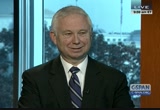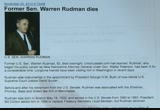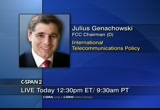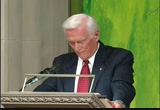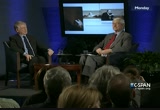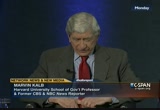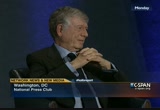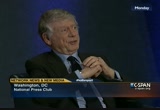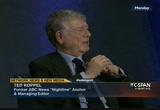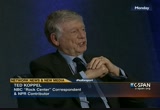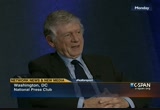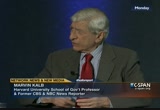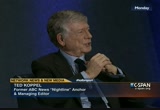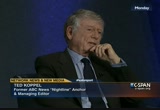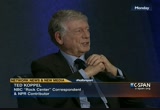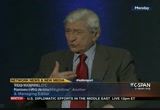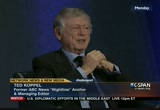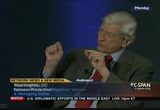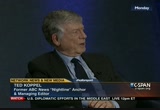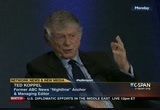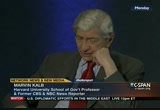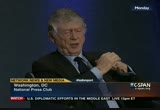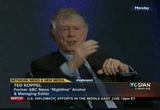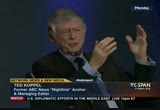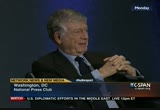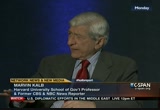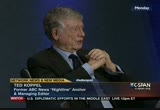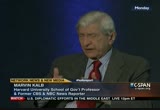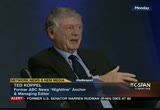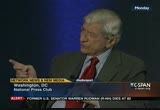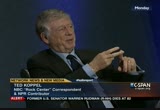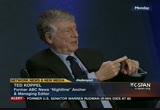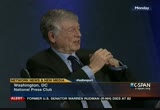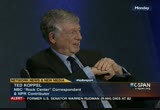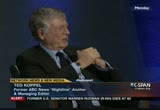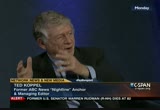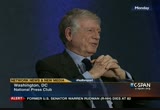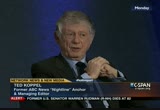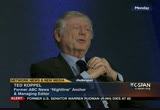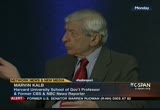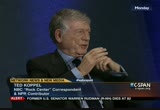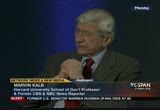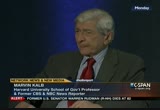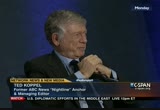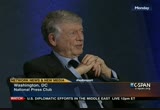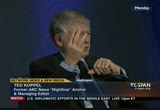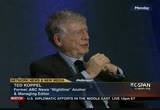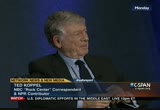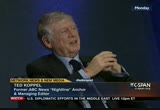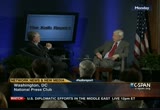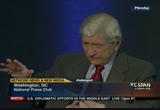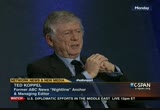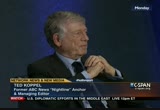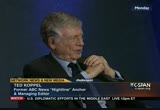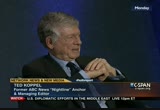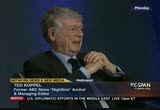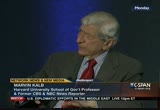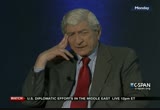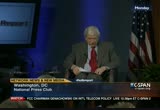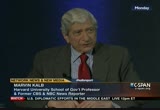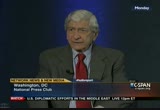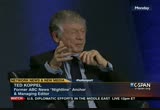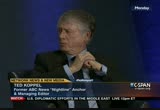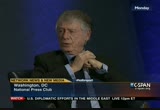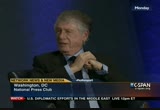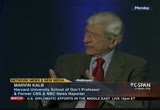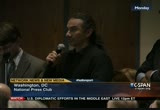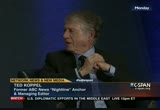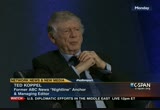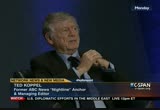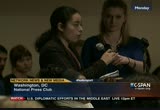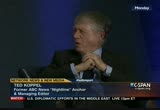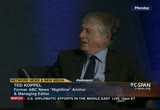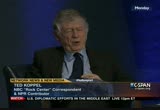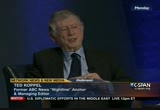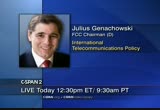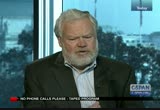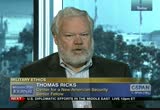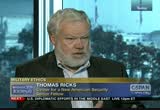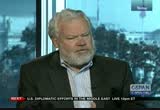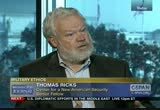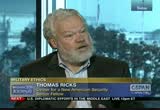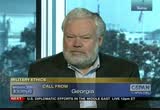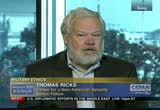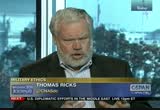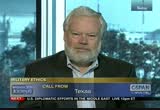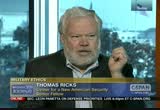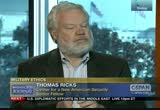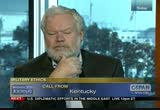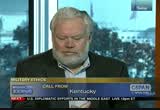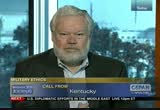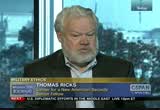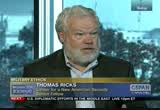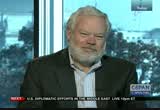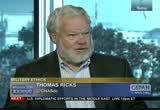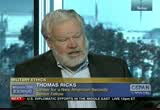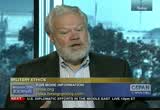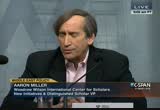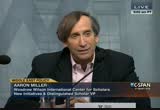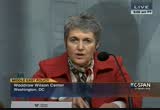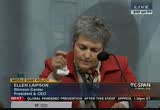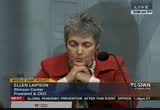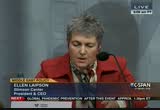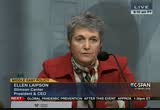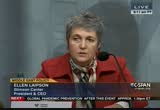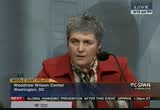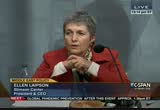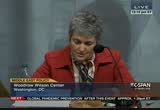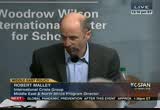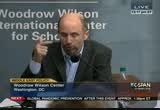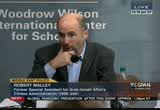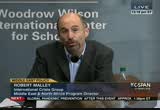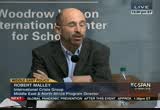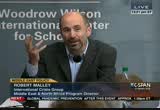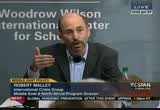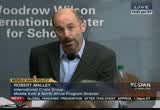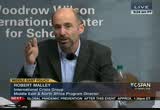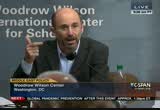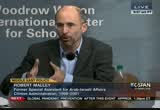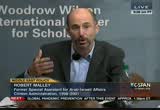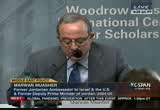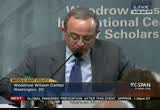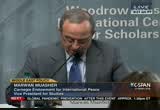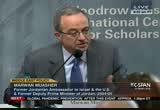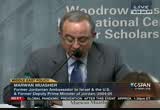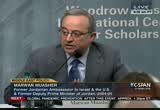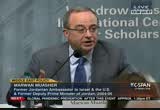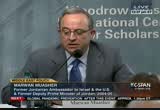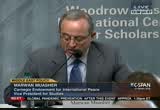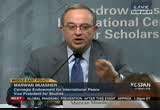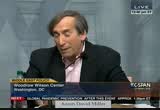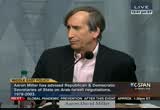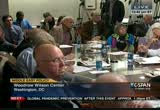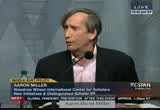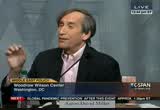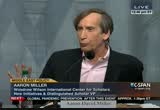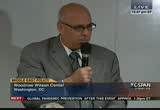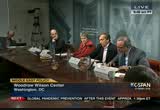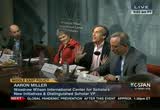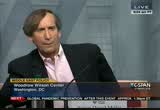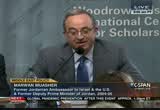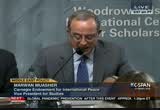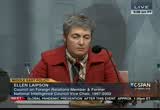tv Public Affairs CSPAN November 20, 2012 10:00am-1:00pm EST
10:00 am
next few years. host: founder and executive editor of the hagstrom report. thank you for joining us this morning. hohost: let's look at one last story. the former senator died overnight according to union leader.com. he had been ill for a considerable time and was instrumental in the appointment by president george h. w. bush by david sutter. before his retirement, he was associated with the law firm in new hampshire. the story points out that he was born back in 1930 and served in the united states senate from 1980 until 1993. he was asked to replace the
10:01 am
treasury secretary by president clinton but he declined. that headline from the new hampshire a union leader. we will see you tomorrow at 7:00 a.m. here on the washington journal. until then, have a good day. [captioning performed by national captioning institute] [captions copyright national cable satellite corp. 2012] ♪ >> here is what is coming up on the c-span network. live at noon on c-span, a discussion on the challenges in the middle east and united states foreign policy. speakers at the woodrow wilson center in could robert maley, ron c-span 2, julius will speak
10:02 am
about international telecommunications policy. live at 12:30 on our companion network c-span 2. and election news this morning, alan west house conceded to powder murphy, putting an end to one of the most expensive house races and the country. the washington post writes that after all of the votes were tallied, murphy held a slight lead but his margin was not strong enough to trigger an official recount. the republican pressed on. bill raising questions about ballots in st. lucie county. that is from the "washington post." allen west conceding to murphy.
10:03 am
>> how does one adequately express his feelings about a special friend? when that friend is also a world of icon, a national hero of unimaginable proportions. and a legend whose name will live in history long after all here today have been for gotten. >> fate looked down kindly on us when she chose the mail to be the first to venture to another world and to have the opportunity to look back from space at the beauty of our armown. it could have been a another, but it wasn't. and it was not for a reason.
10:04 am
no one could have accepted the responsibility of his remarkable accomplishment with more dignity and more grace than neil armstrong. he embodied all that is good and all that is great about america. >> more from the memorial service for neil armstrong, thanksgiving day on c-span at 10:00 a.m. eastern. and before 11:30 a look at life in the white house as a teenager. and just after 1:00 p.m., how scientists are using it gaming the theories to solve problems. >> up next, former abc news reporter.
10:05 am
marvin interviews mr. koppel. this took place last night at george washington university. >> hello and welcome to the national press club. i am marvin kalb. the conversation with ted koppel about democracy and the press. if i use the word twilight to suggest that network news, as we have known it, is on its way out and as something new is emerging. whether what is new will satisfy the urgent needs of our democracy cannot be noted at this time. let's hope that it will. without a free and occasionally rambunctious media, we will not be living in an open society. the free press and an open
10:06 am
society are intimately linked, one dependent on the other. network news -- if network news is in its twilight, then perhaps our democracy is facing a turning point as well. i asked an old colleague and a friend, ted koppel, to discuss the changes in network news and what those changes might mean for our society. ted is known best for his 25 years of anchor and host of nightline, but he has also been a foreign correspondent, a war correspondent, and author, and he has covered many political campaigns. i shared something in preparing with this -- for this program. i ran into the following interesting thought. ted joined abc news in 1963. i joined cbs in 1957. if my arithmetic is right, together we represent more than
10:07 am
100 years of journalistic experience. i mean, that is enough to depress anybody. [laughter] so, ted, what in god's name have we learned about our sacred craft of journalism? >> i think we have learned not to make predictions. >> what are your predictions? [laughter] >> i predict that your title, provocative as it may be, may be premature. i think that when americans are finally realize how bad things are, and what terrible straits our political system is in, i think there may be a resurgence of the kind you and i grew up with. >> it is a marvelous, optimistic thought. >> actually, no, it is a
10:08 am
terrible thought because it suggests that the ship will almost have to sink before people jump into the lifeboats again. >> do you think that we can, truly, even define journalism? if somebody walks in the room and came from mars, and said what are these just talking about? if journalism, explain it to that guy. >> i guess the simplest way is to take it back to where and you and i were young and began in this business. i will limit it to broadcast journalism. when you and i were young, there were three networks. if you wanted to be seen and heard on national television, you had to do it on abc, nbc, or cbs. when i was in vietnam in the late 1960's, mid-60's, late- 60's, if i did a piece in the field, it would be three days sometimes before that he's got on the air. it meant that you -- before that piece got on the air.
10:09 am
it meant that you prepared your stories knowing and you had to survive two days, three days, sometimes even more than that. i have nothing but respect, admiration, and a little bit of sympathy for our colleagues today who quite literally have to report almost all around the clock. >> lives. >> lives. -- live. >> live. whether there are working for television, radio, newspaper, there are going to have to file a blog, if there are going to have to tweet, do a little facebook number, the only thing i never see for which adequate time has been left is reporting. i sometimes wonder how they find
10:10 am
the time to actually gather the material, but it is all there. we have a more immediate available to us today. more means of communicating information than have ever existed in the history of the world. we are so enchanted, though, with our ability to be fast, that i think there is sometimes a lost connection with what we are saying and why. >> i want to pursue that, but i want to ask you first -- why did you even get into this business? >> if i got into it for, probably, much the same reason you did. if that is unfair, because what i'm going to say, i do not think there would have been terribly good at anything else. [laughter] when i was born, and spent the first 13 years of my life in england, my father listened to the bbc.
10:11 am
during world war ii to. i was just a little kid in those days. at least, my memory may be playing tricks on me, but i think i still remember hearing edward moore rose 0 reports and then rebroadcast on the bbc. and i swear, from the earliest childhood on, all i ever wanted to do and be was a journalist. preferably, as close to edward are murrow as i could make it. >> i did a piece for the new york times magazine on soviet youth. i think, in the spring of 1957. murrow read it like it called me and said, can you come talk to me about soviet youth? he was extremely curious. and, of course, i went down to
10:12 am
talk to him and the secretary said as i went in, you have 30 minutes. that is it. max. >> that is okay with me. three hours later, she came in, and said, a think you have other evidence today. -- events today. he used to get so absorbed in these things, that i have listened to him earlier and then met him. i was completely -- this was a great journalist. he was really interested in the things i was interested in. >> if you look back at to the man, i do not think he hired many women. >> there were a couple of women who were part of the world ii. but they did not last. after the war, it went off for different reasons. >> the people that he hired, where people of substance.
10:13 am
historians. writers. people who cared about history. sometimes, when i look at what passes for news on cable television, especially, these days, i wonder where they find these people. >> he cared a great deal about right thing and one of the points you were making earlier about some things that you wanted to last for three or four or five days before there would get on the air, it had to be written and not written well. murrow cared a great deal about style and the way you presented information. >> i will interrupt you for a second. take a look at how awesome, when you are watching something beaned covered on table -- on
10:14 am
cable television these days, it requires a great skill. i am not denigrating it in any fashion. but notice how often would you are hearing is just one ever comes off the top of their head of the man or woman who is reporting. take note of how risky it is for a script to actually be written -- take note of how rare it is for a script to actually be written. if you only have a couple of minutes, there really is still required. the essence of journalism not -- lies not simply -- on in the editing. in determining why one thing is important to a story and another thing is not. and putting it into some kind of context. occasionally, even historical context. you know, folks are pretty good
10:15 am
at ad libbing, but that takes more skilled than most people have. >> you have taken us from what was and you have raised a little bit on what is in journalism today. what has changed? tick off the major changes. >> since you applied again? >> yes. >> first of all, the biggest change in always argue came about in 1968. in 1968, you have to understand, was an extraordinary year. it was the year of the offensive in vietnam. it was the year that lyndon johnson stepped down and said he would not run for president again. it was the year martin luther king was assassinated. the year bobby kennedy was assassinated. if the year of the riots at the democratic convention in chicago. it is not too surprising that
10:16 am
women not pay as much attention as we shed -- it is not surprising that we may not pay as much attention as we should. the television news magazine began, "60 minutes." they have done an extraordinary job over these last 44 years. amazing work. but it also gives something that no television news program had never done before. it's made money. it turned a profit. [laughter] >> to be clear about that, up to that point -- >> if it happened, it was a rare thing. >> we were, for the most part, a loss leader. television news did not make money. >> it was bill who came to you folks who were producers and journalists at cbs and said -- remember? >> he used to call us the tools in his crown. >> he said do not worry about making money.
10:17 am
>> that is right. you guys do not worry about that. what that meant is that when we went out to do a story, we were totally and absorbed in the story. we were not worried about how much money it would take to cover the story. ridges did it. -- we just did it. even as late as 1980, i remember being able to charter a plane from rome to istanbul, because you thought you might be able to get an interview with somebody important for your piece. but now, -- >> now, profits. we have become profit centers of the networks. and you know, off with the cable stations also. being a profit center is a huge
10:18 am
responsibility because it means that you start thinking in a different way. you start thinking not so much about what the public ought to hear, but rather with the public wants to hear. you are now in competition with the other networks. with the other news outlets. not just for an audience, but you are in competition to make money. the way you make money, i will give you a for instance. i may be doing my former colleagues and injustice, but i seem to recall that the last one-hour documentary that played in prime time was on the subject of charlie sheen and his carousing, womanizing, all the other good things he was doing, which were clearly of enormous interest to all of you because that is why they put it on the air. it got a big audience. >> this idea of the difference between need to know and ought to know.
10:19 am
>> when what you worry about is making money, you try to focus on those things that are a. most likely to attract an audience and b. least likely to cost a great deal of money. i remember eight years ago getting a call from my old friend and colleague, peter jennings. he said, ted, have the bean counters been in touch with you? i said, as a matter of fact, i just got off the phone with them. if what the bean counters want to do know from him and me, was, ted, how many times in a year does nightline use the muscle bureau? they had asked peter jennings the same question. how many times does world news tonight use the bureau? and then ask the same thing of the producer of and good morning america and than they did a simple calculus.
10:20 am
so, the bureau coslet say $2 million a year and among all the programs, it was used let's say 50 times a year. $40,000 a report. wow. closedown the moscow bureau. what happened has happened, for the most part, at nbc, at cbs, at abc. most of the overseas bureaus now are essentially just mail drops where you may have some local employee keeping the office open and when something really big happens in kabul, in mexico city, in beijing, in hong kong, what you do is you should then one of the star
10:21 am
correspondents or even an anchor. but the difference between covering the news, year after year after year in a country, maybe even learning the language, certainly getting to know the people, getting to know who the movers and shakers are and what the political dynamic in that country is is not happening in that country anymore. that is also happening in the intelligence-gathering field at the cia where, quite literally -- >> i do not want to go too far. i want to talk to a little bit about the role of cable television, for which you touched on before. in a recent interview with bill o'reilly of a fox, you said making it difficult if not impossible for congress to reach across the aisle and find compromise. you also wrote, not good for
10:22 am
the republic. what you mean. >> this goes back. it is a continuation of the same thing. in addition to demonstrating that network news divisions can make money, there was a technological explosion. it wasn't just the three networks anymore. you have cable, satellite television, and the internet. now there are hundreds, even thousands of competitors out there. what is incredibly cheap to put on the air is a couple of people like you and me just yelling at each other. at talking. what draws an audience is when, in fact, we disagree. when, in fact, we get nasty with one another. what rupert murdoch's demonstrated is that there
10:23 am
really was a hunger in america for something that was less liberal than what the networks for putting on the air. so, fox news was born. fox news has been hugely successful. it earns somewhere between $1.10 $0.50 billion a year. -- $1 and $1.5 billion a year. the folks at nbc took a look at what fox has been doing and figure out if they could make news skewing news to the right, if we could make half of that, let's ask you to the left. and so, you have on cable television news that caters to people who consider themselves progressives, news to people who consider themselves conservatives, you have the afternoon radio talk shows, the evening radio talk shows which cater largely to the conservative.
10:24 am
you have the late-night comedy show, john stewart, stephen cole there, that tend to cater more to the left. and the end result is the area that has gone more or less of fellow is serious news organizations reporting the important events of the day without any kind of political bias. we have grown up as a nation believing we are entitled to hear news that resonates to the news we already -- to the views we already hold. we have seen it this year. a lot of distinguished senators and congress people leaving. snow left the senate because she simply cannot handle the nastiness anymore. there is an awful lot of that
10:25 am
and you cannot in a democracy. >> he made the point -- >> the me finish this point. you cannot in a democracy expect people to be able to reach across the aisles and make accommodations for important issues if they are terrified that in so doing, it will expose themselves to the wrath of the right or the left. either john stewart's humor or rosh -- or rush limbaugh's sharp tongue. >> what you said not to double long ago was that the commercial success of a fox and ms nbc has become a source of nonpartisan -- for you.
10:26 am
meaning what? >> i mean, you and i have known for many, many years that we operated in a business. but as you're saying a few minutes ago, that businesses to make all of its money with "i love lucy" and whatever else was hogback in the 1960's an 1970's. they made so much money that they could afford to spend $50 million a year covering the world. that is no longer the case. and that is dangerous. >> my sense every now and then is that of though there are good journalists in cable television, the whole package of cable television when it is presented to the american people tends to debased about anything
10:27 am
it touches. that does not mean that every conversation is bad. but it does mean that the package, to me, comes through as a negative. as something that makes fun of people. that is overly critical. that is not real. >> a program on sunday mornings, first rate television journalism. for me, he is a smart man who invites smart people on to his program and they talk about important issues in a smart way. i doubt that he has 200,000 people watching that show. it is probably a big audience if he gets that many. it is on a sunday morning which is when programs like that still survive. but you're never going to see that program in prime time.
10:28 am
>> in your judgment, since cable television is the place for your going to get right, left, political conversation, and a cnn living in the middle so awkwardly and a trying desperately to keep its base, is it doing good things for our democracy in your view? >> no, of course not. is hu doing good things? >> the idea of cable television. >> no. >> i feel, quite often, if you eliminated msnbc, fox, and cnn, it would probably improve american democracy overnight. [laughter] things would miraculously get better. people would talk to one another again rather than engage in an
10:29 am
artificial fight which is what most cable television is. >> you take someone like rachel mat out for example. -- rachel maddow for example. >> very bright. >> rachel maddow is a very smart woman and could easily in the old days, and today, i would love to see her as an anchor on one of the evening programs on network television. but the price of that would be that she would have to keep her opinions to herself. it is her opinions that trot the viewership on msnbc. now, she is a very bright woman, as i said. but i do not want to know what she thinks about these issues. i really do not. i want to hear her in ford reporting.
10:30 am
i want to hear her interview people with that sharp mind of hers. i do not want to know where she comes down on a particular issue. but that is seen as hopelessly old-fashioned. >> i was about to say. ted. >> those days are over. >> i just want to take a minute to remind our radio and television audiences that this is the kalb report. i am martin talbot. our guest today is ted koppel. you have described the good old days of journalism as an imperfect, untidy little eaton of journalism. you then went on to say that these days, broadcast news has been outflanked and overtaken by scores of other media options. help us understand the perceived need for these changes because they not only affect the quality of network news, by the way, do you agree with me that it is in the twilight zone a? >> it is in a twilight.
10:31 am
but remember, twilight is usually followed by night and then don follows night. i am still hopeful. [laughter] you know, it is not going to stay this way forever. i think, you know, what tends to happen in this country as you and i have observed over the last 50 or 60 years, we tend to go too far to the right, and then we correct course and passed through the middle and go too far to the left, and then we correct course again i think what is happening to broadcast journalism requires a course correction. as we come to realize that our educational system is not as good as we like to believe, that our health care system is not as good as we like to believe,
10:32 am
that we are spending -- i mean, there are so many things that are on the brink of taking us into real disaster. not the least of them being the possibility of cyber warfare. that is something that television news ought to be covering big time. i am tremendously concerned by the fact that the american public and its military and have never been as far apart as they are right now. we know nothing. we do a terrific job of calling everyone in uniform a hero. we do a terrific job of welcoming them at airports and sang thank you for your service. we know nothing about what is going on in the military. and what is more, the military and military operations are being launched on the basis of drone of attacks, cia
10:33 am
operatives, special operations forces out in the field, and all of that back by a civilian employees, civilian contractors, and we know next to nothing about what is being done by any of these groups. >> because the reporting is not been done? >> welle, it is because we have found the american public will not stand for a draft and the professional military was not enough to fight all over the world. we have been focused on iraq and afghanistan. we actually believe that all the troops are coming back from afghanistan. i will tell you here and now that is not going to happen. we will still have u.s. troops in afghanistan one year from now two years from now, five years from now. where is the press? obviously, these are not issues that the people who run on these programs today -- >> why not?
10:34 am
>> because they do not draw an audience. what draws an audience is charlie sheen. what draws an audience is people yelling at each other. it is not enough to say these issues are important. if we actually -- i know it sounds totally idealistic, but when you and i became journalists as young men, we actually believed that we were entering, really, a special, chosen profession that meant something to a democracy. >> we called it a calling. >> a calling, exactly. >> exactly. word of honor, i never thought i was going to get rich as a journalist. you do not go into journalism to become wealthy. >> the changes we are talking
10:35 am
about, you have already touched upon the affect it has on our society, on the business itself. value systems change. i am not saying we can ever return to the good old days. that is done, but what worries me is whether we can take the value systems of old and try to see them preserved in the digital environment of today. do you think that is possible? >> i not only thing that is possible. you and i need a third person
10:36 am
here telling us what is being accomplished in the digital arena. i think there are people -- we are both having a senior moment. people who look at all the blog sites. >> i did not. >> there are curators today who because there are so many thousands of web sites make it a point of saying, if you really want to know what is interesting in the area of foreign policy or the environment or cyber warfare, we can leave you in the right direction, and the technology is there so you and i can gather material in a fashion that is infinitely superior to what we used to use.
10:37 am
we can harvest information. >> with the reporting, you are getting a ton of information. these curators can provide information, but how reliable is the information? is it based on reporting? >> two key facts have to be made. there is a brilliant material out there that is being well- reported. >> how do you know that? >> i have been told. on the other hand, the implication of your question is correct. we do not know. when something comes across on
10:38 am
the internet we have no way of knowing what the intention, what the goal is, what the bias is of the people who are putting it out there. i will tell you something i learned from one of these talks. it was on the subject of google. the speaker was making the point that he was a progressive, and he said a friend of his who was very conservative, they took their laptops, and they simply type into the search engine the word egypt, and they got a totally different responses. why?
10:39 am
because there is a process going on. every time we search for something on our laptop, we are not only gathering information. we are giving information about what we buy, about what we like, about what our political bias sees maybe -- biases may be, and you and i ought to get the same information if we tie in the same word. that is kind of scary. >> somebody is making up their mind about what we want. >> it is not somebody. it is a series of 0s and 1s. it is a computer algorithm. >> the algorithm is fine, and i understand it exists, and i will salute it.
10:40 am
is there, but i want to know what that has to do with journalism. who gets up in the morning and covers some say -- something? who is going to cover a war? who is going to cover a campaign? without the journalists doing on is information gathering, all this stuff is below it. >> there are plenty of people who are going to do gathering, but the key word -- >> that is not true. there are fewer reporters covering the war in afghanistan
10:41 am
then there has ever been. >> fewer american reporters. >> american and others as well. >> i frequently will watch the bbc or of jazeera, because particularly when things are going on in the middle east i am going to learn more from people in the area. >> do we know they are reporters? we know they speak arabic. >> we know they are reporters. do we know they are objective is? that is a different question. thus we do not. >> we have almost given up in our own country. it is still possible to pick of the new york times, to listen to npr, to watch the news hour. the outlook is there. my old friend says, is dull. sometimes i say, you are a little too daring. but is there. there is still good journalism being committed.
10:42 am
the good journalists cannot help it if the public seems to be moving in other directions. i am making the point, and i do not know if i am wishing for this to happen, but i think it will only happen when people realize how devastating the consequences are of not having objective journalism. >> do you know clark kent? >> know him well. we have on occasion use the same phone booth. >> clark kent is no longer the reporter for the daily planet. >> what does he do now?
10:43 am
>> he is a blogger. >> where does he change? >> probably in the curator's kitchen. that is an indication of how profoundly different journalism is from years ago to today. i am saying this is so much more difficult to find, and the areas you will go after are not terribly reliable, and i would like to think about the north star of journalism today. when you started, you had somebody who did extraordinary things at the network, including starting nightline. for me it was a lot of other people. who are they in today's world? >> the fact is he had been the president of abc sports, and we
10:44 am
were terrified of this guy who came in wearing his jungle suit and his bracelets he wore. he was not one of the champions of great journalism when he came on. he became that. he evolved, and he is involved because he ran up against in movable objects like helen k. smith and frank reynolds, and people who still believe good
10:45 am
journalism was important, and nobody -- >> he recognized good journalism and moved toward it. >> he recognized it. i will tell you the back story of my life. for about a year before the iran hostage crisis common they came to us and said, anytime something of major importance happens, run a story on it, 10 minutes, 15 minutes. he initially wanted a one-hour news cast at the dinner hour. the affiliated stations would not go along, so he decided he was going to seize that time, and by the time we got to the iran hostage crisis, we were running out of things to say. he said to us, i do not care.
10:46 am
tell me the difference between a sunni and a shiite. tell me about assad and how he came to power. he kept that program going, because he recognized there was a tremendous american appetite for this story. had it not been for that appetite common and it wouldn't not have been born. >> you did not have the tonight show or the letterman show. >> i will tell you something that has changed enormously. when nightline began in march of 1980, you did not have the letterman show yet on cbs. they would be run some old and
10:47 am
trauma, but among the three programs, but tonight show, the cop drama, and nightline we had 70% of homes watching television at 11:00 at night. these days they are lucky to have 25%. that is what happened because what you did not have 35 years ago was cable, satellite the internet, and all of those things have diluted the importance and the reach of the network. >> maybe twilight is too soft. >> you still have evening newscasts. among the three of them, i suspect we have between 15 million and 20 million viewers.
10:48 am
it was 50 million. cronkite alone probably have about 20 million people. >> that certainly is true. the responsibilities of journalism to democracy and to our society. i want you to talk about about a little bit more. i want you to explain why there is this connection between the flow of news and a vibrant society. >> if the american voting public is ignorant of the issue, is uninformed, how can it make intelligent decisions? it is bad enough the citizens united decision of the supreme
10:49 am
court has resulted in -- the new york times said the amount of money spent on all the election campaigns, $6 billion. i was shocked by that. i moderated a discussion. it was fascinating, but mr. rove made the. we spend infinitely more than that on dog food. >> it is absurd. >> is. as much as i love op eds, if they end up being produced, people keep saying things were much worse in jefferson's farm.
10:50 am
yes, they were, but you only had broadsheets being distributed. you did not have everyone walking around with a communications device. information is spread so quickly that if we do not have reliable, trustworthy, objective sources of information, our whole electoral structure is going to collapse under its weight. >> cnn's story about how the nyse-listed under 3 feet of water -- cnnn's story about how
10:51 am
the new york stock exchange was under 3 feet of water, it was not true. they got a lie. i do not want to pick on cnn, but that is one of the dangers of trying to retain the best standards, some practice, some place where you can turn and say this is the right way of doing things, and this is simply wrong. despite all the good things you have said, all of that stuff
10:52 am
being said, i am left with an uneasy feeling. i do not know where the information is coming from. remember years ago when we knew every cameraman who is taking pictures of some of zandt in cairo. -- some event in cairo. you knew it was and of effective look. -- an objective look. i do not know who is taking the pictures. they may be working for some small network because the network does not want to bring in its own cameraman. >> notice if you watch more than one newscast, notice the number of times you will see precisely the same video when it comes
10:53 am
from overseas in large part because the networks do not have their own reporters, and they have brought it from the same source. . no. 2, what is wrong with having a local reporter covering the event? a local reporter speaks the language and knows the people. let's say the local reporter is reported from tehran and the local reporter knows if he or she makes a misstep, they are going to be arrested and thrown in jail. the american reporter may get thrown out of the country, but that is probably the worst that is going to happen. i find there is no willingness
10:54 am
to believe objectivity in journalism is possible. i keep hearing there is no such thing as absolute objectivity, to which i say, when you go to hire a lawyer, and you ask, do you like me? if you do not like me, you are not going to be able to put your heart into this thing. when you go to a doctor, you are not asking what his or her politics are. you want that doctor to deal with you on her best professional expertise, and what do our critics want to believe? i argue there really was a time when men and women could be a professional journalist capable of objectivity. that does not mean they do not
10:55 am
go home and rail against the darkness. that does not mean they do not have the favorites in an election. to this day, you have known my wife for many years. she does not know how i vote in an election. i do not tell her. i do not think it is appropriate. >> and you are still married? >> let me put it this way. she knows everything else about me. i think she can figure it out. i never told her. >> that is so interesting. what does that say? >> i have believed since i was a young and reporter that my personal opinions have no place. >> when i talk to someone who
10:56 am
was my student, bill believes profoundly you are a biased guy. i would say, you have not a clue as to how i vote. he said, everybody votes. that attitude has been effective as a kind of truth by so many people. >> absolutely. until we are prepared to except the principle of objectivity or at least a general effort toward objectivity is possible,
10:57 am
patrick mcgann -- monahan said everyone is entitled to their own opinion. these days we believe everyone is entitled to his own facts. you want right wing facts, we have got it. you want left wing facts, we have got it. >> how have you made it clear for people there was a basic impulse on behalf of the reporters to tell it straight, but cable is where you are getting the opinion. cable is where you are getting the opinion on the networks. they say, you are as biased as everyone else. did you will not admit it.
10:58 am
>> i think the problem is they are not putting the money into the kind of news coverage that is vital to a democracy. the money would help. when has the world ever been a more dangerous place than it is now? i happen to believe at the worst times of the cold war, the fact of the matter is there was a balance between the great powers. these days we need information from the third world more than before. we do not have the reporters. >> that is true.
10:59 am
i am sorry to say at this time we have to run out of time. they have got to pay respects for people like us. i want to thank our audience who has been so polite tonight. they have been able to see us through the magic of the internet. they can actually see us, not just on cable, but they can see us through the internet all over the world. it is a magnificent thing, and i want to thank our guest. [applause] let me close with the following thought. we are all dazzled by the digital age and understandably
11:00 am
so. given the speed and access of everything live is truly amazing, but every now and then i worry we may be losing sight of the fact that this new technology is only a tool. it is a tool for the dissemination of what we have discovered. it can never be considered more important than the content of what we have discovered. hourly daily broadcasts, the story that need selling, a crime or of this judgment that needs exploring. i asked our their indian and new edward r. murrow -- are there any new edward r. murrows? we need that. journalism is essential to democracy. he once said, this is no time
11:01 am
for fear, and he was right. rise up. ted and i have done the best weekend. now it is your turn. use these modern tools, but use them well. now once again, good night, and good luck. [applause] you have been warned. this is your time to ask questions. there are two microphones. i see one over there. if you get up to ask questions, that is fine, and the idea is
11:02 am
to ask a question. do not make a speech, because i will cut you off. i will be very nasty. why don't we start off on the right? >> how are you doing? can you assess the coverage of the israeli-palestinian conflict? is it clear who is doing the best job? >> there has been a war going on in gaza for well over 10 years now. it has cost more than $5 million.
11:03 am
5 billion people alive died of starvation, disease, have been driven into the jungle, more than 5 million people. we have barely even noticed it. i mention that because journalism is frequently affected by national interest. to the degree the perception of what happened in the congo is less important than what happens in the united states, we do not cover it. we are engaged by what happens syria, but i do not know if shed a great deal of light. i know you began by asking what is happening in gaza and what i
11:04 am
think about that. >> yes. >> any time israel is involved in a story, did becomes excruciatingly -- id becomes excruciatingly difficult to cover, because there is a sense of identity in this country with israelis, and many reporters, old friends and colleagues of mine used to be criticized for taking an anti- israeli point of view. he spent many years living in the arab world and had a sympathetic. of view to arabs.
11:05 am
i think what is happening in gaza right now meets in the definition of tragedy. the israelis cannot be expected to stand by while their cities are rocketed. on the other hand, the idea that the israeli defense forces are equally professional, the number of casualties on the palestinian side are going to be much greater. they are leaving an impression there is something unfair. this is the time you need correspondents who have spent years in the region, because by
11:06 am
and large, you ask what i think of the coverage. i think it is surface. it focuses on the casualties. you do not know what the possibilities may be for agreement on the sides. i think that is one thing we have lost in not having correspondence to report from the region year after year. >> it is interesting that a couple nights ago, and abc world news tonight had a tour during another story while the gaza story erupted, and she had a from the region year after year. big intro.
11:07 am
they gave her about 45 seconds to do the story, and you could see she could not get it out. it was difficult, so that is yet another dimension of trying to make everything right size, even and alan -- an analysis from a reporter who really does understand that story. it would have been wonderful to hear more from her. >> yes, please. >> you mentioned an interesting point before he cut you off about our intelligence services. >> he does that all the time. >> it was the moment you were talking about how our intelligence services are may be stretched too thin. you were intimating we were not only having a lack of
11:08 am
journalists of we were stretched. i thought it was interesting because the americans trust the pedagoguery. >> essentially the same thing is happening within the intelligence community, and that is the perception that technology is an adequate replacement for human intelligence. there is a perception you can get anyone from anywhere. you can reach any part of the
11:09 am
world in 18 hours or less, and by virtue of the satellite, you can report instantaneously, but that is a substitute for having our reporter on the ground for years. the same thing has happened for ages. the intelligence community has suffered budget cuts, and people say you can get the same kind of information with intelligence and reconnaissance when having a unit on the ground gives you a third dimension you cannot get by technology. >> yes please? >> i am a retired former service officer. i ended my career shortly after
11:10 am
afghanistan at the state department with a press officer who has never worked with the press. i am wondering if those of you in the networks ever noticed it went away, and do you think that is part of the weakening of the ability to report stories with great object committee oversees? >> we became friends after i came back three years in indochina and was assigned as a correspondent. i have been blessed throughout my television career with having competitors. as you may imagine, you do not travel with people from your own network. did you travel with the
11:11 am
opposition. i was impressed with these men's performance. during the time we travel together, henry kissinger and i in the middle east, we always have somebody on the plane, and i remember a woman who was a reporter, and she did not talk much. she was a very good reporter. i rather suspect you do not have anyone traveling with the
11:12 am
secretary anymore, and that is a plus. >> i want to share something. being a competitor, when we travel in the middle east, i had a bad condition, and we would arrive with our overnight bag. abc news picked up very often my typewriter, my overnight bag because he could see i could not take it up. that is a competitor. >> i was hoping you could talk about the activity. i use the example of global warming. how would you cover that story
11:13 am
in that time when most of the community appears to be pretty solid on one side. who do decide is the most credible people in that discussion? >> i was for almost 26 years the a anchor of the managing editor of nightline, and i was deaf to reporters who would give one opinion for, one of opinion against. it is the laziest form of journalism in the world to the degree one side or another can be ascertained as having the facts on its side, you have an obligation to report back. i do not think there is an
11:14 am
obligation to say, on the one hand, newtonians believe and apple will fall from the tree and hit the ground and there is a law simply because an idiot and claims the other was. objectivity it does not mean taking one of this side and one of that side. your job as a journalist is to do the reporting, and to analyze it, to put it into proper context, and if the overwhelming scientific community, or the scientific
11:15 am
community overwhelmingly says there is global warming, the use -- do you go in the direction of some other intelligent voice? why not? you do not do it now with equal time. >> when that was first directed at the networks to be objective and fair, what they would do, as you remember, they would put a republican up here for 30 seconds and a democrat for 30 seconds, and they felt they were telling the story, but they never got at the essence of objectivity as you have so well described its tonight. >> my name is catherine rodriguez, and i am a junior journalism major at gw. my question is in this volatile climate, we have noted several instances where major news networks rushed for information that happen to be wrong.
11:16 am
how do we balance accuracy with the desire to be the first to break the news? >> that is a good question. >> i have been lecturing about this desperate approach, which i think is often the driving engine, particularly of 24-7 cable news. somehow when a major story broke, i still remember moments of huge self congratulations. if we could say, we have the story one minute 38 seconds
11:17 am
before, and i remember saying at the time, i do not know of anybody out there who is sitting there as we were sitting there with 10 television monitors aware of the fact cbs had something first, and we were third. if you are watching television, are you switching madly between the channel 7? what was bad 25 years ago is horrendous today. what if i am watching cnn, and i am not constantly flipping back? i have teenage grandsons who
11:18 am
seem incapable of watching something for more than eight seconds at a time without switching to another channel. did i answer your question? >> not really. there is one more year. this will be the last one, because we are out of time. i want to apologize to everyone waiting to ask a question. when this is over, why don't you deceived mr. koppel -- besiege mr. koppel? >> i have an on-line news site that is usually considered to be dull and boring, and we have
11:19 am
these not just to disseminate but to get the information out, and throughout the evening it seems we have been given this choice of charlie sheen reporting and important news presented in a way that is the goal, and we have so many tools at our disposal, why do we need to think of important news us something that cannot be cool and engaging and fun and even profitable? why does it have to be presented as something dull? >> you may be surprised to learn i do not entirely disagree with you. for many years i used to tell the staff there is no story out there we cannot do it in an
11:20 am
engaging, interesting way. i think you have made a mistake of interpreting what we have been saying when we refer to important that important means dull. on the contrary, i think those are the things that are most important, and it is our obligation not merely to say, here are the facts, do with them as you will, and we have to make the movie it interesting. if interesting means controversial, it's interesting means argumentative, it's interesting means sacrificing
11:21 am
objectivity, i guess -- if interesting means sacrificing objectivity, i guess you are right. >> i do not think you will ever be seen as dull. thank you. [applause] >> thank you. you are as wonderful as ever. >> in about 40 minutes, the conversation turns to challenges in the middle east and foreign- policy. it would include the former deputy prime minister of jordan. that's live at noon eastern on c-span. on c-span 2, and talk about free speech, economic development and the availability of broadband
11:22 am
11:23 am
i hope this extends to professional execution of duty. we seem to be focusing much on more on personal behaviors than i would say private papers. the -- no criminal charges are likely to result against david petraeus. there might be a minor charge against paula brought well, partly because they are embarrassed that they investigated a lovers' quarrel. by ho they look professional. what people do in their offices as well as what they do in their bedrooms because i think the real scandal is not what ever david petraeus did, it's -- we put up with years of mediocre generals until we had him there. the real scandal in afghanistan is not that the general ford with a woman. news flash -- u.s. marine fliers
11:24 am
with a woman. the real scandal is we have had 11 commanding generals there in 11 years, which is next. it's no way to run a war. i can't imagine rotating eisenhower home in 1943, think now it's time to give someone else a chance. there is a serious in the way world war two was prosecuted i don't see in the mindless rotation today. host: if you are a member of the active military, you can call the number on your screen. how much are ethics talk about in the military, especially at a higher level? guest: ethics are talked about, but i worry about lip service being given to ethics and not
11:25 am
sufficient attention being paid to confidence. being a general now day is like being a university professor with tenure. you can do a lousy job and you will keep it as long as you don't embarrass the institution and as long as you keep your pants on. you need to look at ethics, but you also need to look at whether we are giving our soldiers good military leadership, which they deserve. it is something i think as a society we are not very good at anymore. the media, congress lacks sufficient experience to know what a good general looks like, so i tend to think we focus on the things we do know. the two worst things to cover our sex scandals and sports because editors think they are experts on both. need to think more about how we get military leaders and at how the troops happen. the talk to troops, they don't care much whether there general
11:26 am
is sleeping with someone. they will put up with alcoholism, racism, and your son of a bitchism like they did with general patton if they are confident it will get them to the war. they what one thing -- they want to survive and get through the war. if they're not going to survive, they want to know their lives were not thrown away, that they didn't have some booby head running the military operation. and we have had some real booby heads. i'm not talking about front-line small units. those are excellent these days. we have a well-trained, well- equipped, cohesive combat force. what we don't have is particularly high standards for generals executing their duties. >> the "washington post" story that we looked at which looks at
11:27 am
the former cia director and marine general and digs into what else is going on in the military. the military has been scandalized by recent criminal and administrative probes of top officers. an exceedingly high number for an organization that prides itself on honor and probity. -- guest: some of those are just natural human slippage. people make mistakes and things
11:28 am
like sleeping with someone in your chain of command should be punished. but what we're seeing with 10 years of wars, david petraeus is not the david petraeus i've known for 15 years. i have to wonder whether his four combat tours -- three in afghanistan and went -- three in iraq and when in afghanistan, the stresses on him combined with the kind of disorientation upon retirement -- he had been in the military for 40 years. suddenly he is outside that world. i think the combination of years of stress and retirement may have disoriented him morally to the point where he engaged in this adulterous affair. what does bother me is he and his family, his wife, were exceedingly generous over a decade of time with their time,
11:29 am
with their emotion. they gave a lot. i worry that when the time came for the -- for the country to be generous to the petraeus family, what must have been antagonizing time for them, that we were not generous. we built david petraeus up into something more than human and then expressed shock when we found out he was human after all. host: let's go to it independent call and in north carolina. caller: i am a sergeant in that united states army. there used to be a joke when i was coming up its air requirements recharger first- class that you have a divorce. it's sad, but there is such a high divorce rate and disconnect between soldiers and their families. going overseas sometimes.
11:30 am
leadership -- you trust leadership. david petraeus was ready, but i'm speaking to the fact that the man had been separated from his wife for 10 years. the other general, their dedication and service is great. the men did not have the opportunity to maintain their connection designed by god between a husband and wife. sad, -- i think our country is sullying his name because of that one act. it's not like he was an indiscreet man. he was honorable men. guest: i agree that this whole
11:31 am
situation says more about the nation and it does not david petraeus. 1% of the country has been fighting are wars and 99% have been ignoring them. i think that's a bad situation, especially for a great democracy, it's morally reckless. we have asked so much of people, and -- sending them out again and again on deployments, and i think we should not be surprised at the toll it takes on people, and on marriages as the caller says, just the stress, posttraumatic stress this step -- posttraumatic stress syndrome. we have run up a real emotional bill with these guys and we need to show some understanding when the bills start coming through. host: a democratic call from connecticut. caller: thank you for having me on. i was talking to my father about this years ago. i noticed that in listed people
11:32 am
have always been held today -- held to a far higher standard. those people were all brought up and court-martialed out and they're given dog leashes and that had to be given to them from the higher ups but none of them are ever prosecuted, but the enlisted people always were. the officers always got a pass. i am seeing it's finally come around but it took many years. i was just wondering if you noticed the same thing? >> it is a good point. military call the difference banks for different ranks. of the grave is a good point. -- of the grade -- the commander of the entire iraq were at that
11:33 am
point was directly responsible for what happened. under him, they stuffed it tens of thousands of detainees into the system and they were overwhelmed. you have a poorly led unit, poorly resource, also a result of command decisions, yet general sanchez was not punished and left iraq better that he was not promoted. the sense of entitlement among today's generals can be shocking. i did my 1 year, now promote me. host: in your book, "the general's." you look at leadership over the decades. how hard is it to get fired in the decade? how hard is it to get to be a leader and get demoted and it moved around? >> it very hard for generals to
11:34 am
be judged on their professional conduct. it's very rare. as far as i can tell, the last general in the u.s. army relieved as a division commander for poor combat leadership's in 1972. many decades ago. as far as i can tell in my research, not a single general has been relieved for being a poor combat leader. we have seen general for leave for various other personal lapses, but i'm more concerned with professional competence. i think we should care more about the lives of our shoulders -- bill lives of our soldiers that we do the sex lives. why is no would be relieved in iraq where as and world war two, relief was quite common. general commanded combat divisions in the world war two
11:35 am
-- of 155, 16 were fired. that is a relief rate of more than 10%. in world war two, he added almost darwinian system. you had 90 days to succeed, get killed, or be promoted. or be relieved. a lot of guys were relieved. brigade commanders, battalion commanders, the sense was this is too important, too serious to care about officers feelings and careers. we need to win the war and give the list of the best leadership and a fine. that's a genuine sense of professionalism. i think the generals have lost a lot of sense of professionalism and nowadays there paid more like a union or the guild in that they seem to be responding last to the sense of duty to the
11:36 am
american people and more to take care of themselves and each other. >> in a recent piece in that new york times, questioning the brass, our guest quotes a recently retiring serviceman. guest: i think it is part of a general reaction to the vietnam era. no one wants to be critical of the troops to carry out these missions. yet in that, we have cast too wide a net. we don't understand that one way to support the troops is to give
11:37 am
them good leaders. they did understand that in world war two. there was an obligation to give people the best possible leadership. in vietnam, they rotate officers through on combat tours of six months. we know that physically speaking, when you have a new combat commander for a soldier, you are more likely to die in combat. they tried to give as many officers combat exposure and that directly resulted in the death of american troops. that a scandal. host: a republican from colonial heights, virginia. you are on the air. last try. call inve on to a georgia. turn down your television when you get on the air. caller: how are you doing this morning? i just want to say there's a lot
11:38 am
of problems with political things. my cousin smuggle the movie out of iraq that shows weapons of mass destruction being used and stuff like that and it shows the un running a caravan with army trucks and taking these weapons and to syria. the fellow who did the movie to begin with got murdered. putfilm -- i'm going to some of it up on you to but you've got to see this. some of it is so graphic that i'm going to have to edit it myself before i can put it up on youtube. democrats hate soldiers. i don't know why they hate him
11:39 am
so bad. they did not want petraeus to make that more work. this movie is going to make amends with them. guest: i look forward to seeing the evidence. but one of the great myths coming out of the war is weapons of mass destruction were taken to syria. i looked at this evidence that has been available in the best evidence i can see is there were truck convoys moving from baghdad to syria just before the american invasion. but what they were, the evidence indicates were the baath party records, personal jewelry and cash that was later used to fund the beginning of the insurgency in iraq. it was not weapons of mass destruction. there are films you can see of weapons of mass destruction
11:40 am
being used in iraq. we know of these because saddam hussein used chemical weapons against kurdish people in some air strikes years earlier. i wonder whether some of what you see might be that takes of the strikes on the kurds. host: a question from twitter -- guest: it's a good question and goes against the issue of professionalism. one thing i love about george marshall, the army chief of staff in world war two, at the end of world war two, the head of the "time" magazine empire offered him a million dollars to write his memoirs. he said he couldn't do it because he would either have to lie or heard a lot of people's feelings. he didn't have much money in this would have made him a rich man, but he turned it down.
11:41 am
i mention this because today, so many generals go into the defense industry and then they sell weapons to their former subordinates at the pentagon. i think that is kind of an abuse of the military profession. similarly, another abuse is when we hire military officers, especially general, to endorse political candidates. i have no problem with joe smith endorsing a political candidate. i do have a problem when it says are major-general joseph smith, retired. he is using his service and his rank for a political purpose. i think that is an abuse of the profession. this takes me back to defense secretary panetta's study. there are a lot of aspects to being a professional. there are very few professions, law, medicine, clergy, military -- the commonality to them is
11:42 am
you don't do it for profit. you're supposed to do it for the greater good. if you do it for the money, you become a mercenary. there are a bunch of questions to ask about the military profession, which is the theme of the book, which is what has happened to the military professional, the leader, over the last 50 years in our society. host: a call from texas on the democrats' line. caner: let's see how much i get out without being hung up on. petraeus found 147,000 ak 47s in iraq. he gets 12-year-old prostitute into the green zone with our military takes -- military tanks. his uncle gets billions of dollars of contracts. you know what i say?
11:43 am
obama should do like bush did with 9/11 -- stand on the debt and and your family billions of dollars. you have daryl issa in charge with soldiers electrocuted and $60 billion gone. if you are a good a little soldier and a good little general and look the other way, you get to work for the bush family. the carlyle group and the essay i see who just got a no bit contract that the neocons gave all these weapons to and train all these terrorists and taliban. host: kathy has a lot of anger and issues she has brought up. let's start with a first promise and get at the heart of what she
11:44 am
is concerned about. guest: 2 issues that really struck me in her rent. first, billions and billions of dollars were wasted in the iraq war. second, the cia scandal -- the real cia scandal in my mind is that we endorsed torture as a national policy, brought to account for that as far as we can see. i wish the fbi were investigating american torture, rather than american love affairs. and this struck me with security contractors. we have had two months of heated controversy about benghazi and what happened. it was bad. four americans were killed. hundreds of security contractors were killed in iraq.
11:45 am
i have written two books on iraq and i have never been able to figure out an exact number. the answer is no one cares and no one seems to care still. the official tally leaves out at least 57 incidents that we know about. the tally is quite suspect. this puts aside the foreign security contractors, south africans, costa ricans. there seems to be no tally of this at all and nobody cares. i have got to wonder how much of the mess in benghazi is simply fueled by fox news, poisoning the american bloodstream. it really bothers me. i compare that to the total carelessness about the deaths of security contractors in iraq. >> thomas ricks writes a blog on foreign policies website.
11:46 am
ricks. foreignpolicy.com. he is the author of many books, including a new book called "the generals." let's hear from mike in kentucky, republican. caller: good morning. i think this is a very interesting conversation. i am retired, a 24-year senior nco, and i have served under the petraeus command. my comment is that you cannot actually have a conversation on military ethics when you're fighting a war of aggression. it is naturally agreed a conflict of interest. would you find in a senior command, like field officers
11:47 am
like general petraeus, these guys are caught in a catch-22. once they receive their one star, they are sent to charm school. they're taught appropriate procedures in charm school. they sit in hearings and panels. they had ended a lot of careers of officers over the same behaviors. when i hear about these guys, you know, general petraeus has four combat deployments. senior officers do not fight in command, so he was not under some post-traumatic stress incident that caused him to perform this way. he was just negligent and arrogant with his behavior. it was appropriate for him to resign for the position that he was in. military ethics has always been put to the test. those of us that served, we were always in positions with
11:48 am
young female soldiers and we understand that there was a high moral code of ethics that we had to live by. we expect the senior field officers to do the same. that is my comment. host: before we let you go, share your experience. how was that code of conduct and still dying in you? caller: how was that code of conduct instilled in you? caller: when a soldier science his commitment to service, he relinquished his constitutional rights. he has trained over and over again on his code of conduct. he understands his rules of engagement. these things that are drilled into a soldier over and over again. for a soldier to participate in
11:49 am
this conduct, he really has to work at this. we have several cases -- article 134 is the adultery case, and the senior field officers understand this. nco's talk about this all the time. a lot of friends have lost their careers over adultery. it is not like the military ignores these situations. we learn about this as young junior nco's. this -- host: tom has a question for you. guest: did you see soldiers charged with freestanding 134 adultery charges? adultery, nothing else -- my experience, adultery gets thrown in in the course of other things.
11:50 am
something like you use the credit card to visit your mistress and they throw in adultery on the improper use of funds. did you just see adultery alone? caller: normally in a senior command and high-ranking, cid can investigate those things because they can be traced. you will not find that in the lower levels. only senior field command. the lower levels do not have access to those types of things. host: thank you. guest: he mentioned in charm school, which is a training course for new brigadier- general. i was the first reporter and i think the only one ever to attend charm school. i asked in the mid-1990's if i could go, so i went and took this course.
11:51 am
there was a lecture given by the inspector general's office called booze, broad, airplanes, money, and golf. these were the things that get generals in trouble. the second thing, i disagree on this issue of petraeus and stress. yes, petraeus was not a frontline commander in overall command, but when he had the 101st airborne division in mosul, he was exposed to quite a lot. even in his second -- third tour when he was overall commander in iraq, there were a lot of rockets. i remember landing in baghdad once in 2007 and on my first afternoon in downtown baghdad -- we lived out in the city, not the green zone, the reporters, and i counted about
11:52 am
20 rockets, mortar shells going over our heads and a landing in the green zone. even in the green zone, sometimes there was a sense that you were under combat conditions in quite a lot of stress. host: huffington post has a story about the air force reports released about a scandal at an air force base in texas. investigations of at least 25 military training instructors led to charges against 11 -- host: what kind of message does this send? guest: the commanders need to pay more attention. i was glad to see that it was not just the drill sergeants or the drill instructors who were
11:53 am
charged. commanders suffered consequences. this is one thing that the navy has retained a tradition of, going back to the nautical tradition. the captain of the ship is responsible for everything that happens aboard his or her vessel. therefore, the army, i think, have lost some of that sense. i am glad to see that commanders are seven consequences for what happened on their watch. host: an independent caller, welcome. caller: thank you so much for your books. they brought back some nice memories and some bad ones, too. guest: i was once told it was the funniest book a marine ever read. caller: it speaks to several things you know right away if
11:54 am
you have been in the marine corps. i wanted to mention politics and the service. it seems like we have a system that is set up to bring up the more political nature of a person and to promote the more political over the more ethical, perhaps. because there is always this weeding out of people as you get higher and higher, both in the unlisted and in the officers' corps, but it seems to be promoted even more in the officers corps. at some point, in order to get your star, you have to go before congress. the levels of promotion and your influence and interaction with people within the political sphere seems to be more and more ingrained and you have more and more to cover yourself for. can you speak to that and how that might affect how generals are treated? thank you. guest: first, i want to say how much i envy you living in that part of georgia.
11:55 am
it is a beautiful place. if i could afford it, i would buy a house there. what you are speaking to is how we promote people and why we promote people. that is the theme of this book. because you want accountability. you want to reward success, punish failure, and promote the promising. we did that in world war ii. they demanded good leadership. that was the one criteria. if you do not provide it, they moved you want. one of my favorite trivia questions, who is major general james chaney? i have asked this in military audiences and nobody knows the answer. predecessorhower's as the american commander in england. george marshall fired him and he ended the war commanding a big camp in wichita falls.
11:56 am
if you have accountability, if you have a system that rewards success, then people understand the structure and they try to be successful. if you have a system that is somewhat politicized with bureaucratic politics, if you do not stick your head up, do your rotation, keep your nose clean, and moved along, then you incentivize toward mediocrity. nobody takes risks and the war never ends. that is kind of what we have now. we have a problem in that congress does not know how to recognize military effectiveness anymore. in vietnam war, two-thirds of the members of congress had military experience. today, more than two-thirds do not. as a nation, as a political elite, and the media, people do not know how to recognize military competence.
11:57 am
so the generals are left on the their own. frequently, the generals do not know either what military competence looks like. they know what consensus and getting along looks like. they all take care of each other. we need more outliers. petraeus was one. he was not well-liked by his peer group in the army. he was seen as an outsider. he likes washington and likes politicians and reporters. and he talks with them. these things made petraeus suspect in the eyes of army generals. you'll see the lessons that generals take away, do not talk to reporters, avoid congress, and keep everybody at arm's length, and do not be too smart. those are the wrong lessons.
11:58 am
you want generals able to understand difficult circumstances in warfare. to do that, they need to be able to think critically. to do that, you need to be educated. we have a lot of generals who are well-trained but not well- educated. trained on knowing how to fire a machine gun. educate for the unknowing. how do i go into a small, difficult, messy war and discern the facts and decide what is important and what is trivial? decide what to do to change the situation and then implement that solution and issued orders to thousands of people. to be a good general, you need enormous physical energy and intellectual energy. right now, we have generals who are all very fit, but many of them do not have that intellectual energy. an example would be tommy franks. not well-educated in generalship. thinking about politics but
11:59 am
that is not his job. it is said that the job of the general is to connect the political and the military. the military operations have to have political consequences. >> you can find all of this program in this c-span video library. we're going to take that to the woodrow wilson center for a discussion on the the middle east and u.s. foreign policy. the conversation includes robert malloy. they're just getting started here on c-span. >> my colleague who is the president for new initiatives and a distinguished order --
12:00 pm
scholar for the center, will moderate and take questions. we have a number of people, so aaron will be taking questions from you here. you have been coming to our meetings over a number of years, so let me say that he is the author of the forthcoming book "can america have another great president/" we're all delighted to have with us a very high-level panel with speakers who have spoken at the center before in different capacities. i think we have marwan, he was
12:01 pm
ambassador, when he was vice president for studies at the carnegie endowment. he was the foreign minister and the deputy prime minister. you see how far back he goes. ellen laipson is a very good friend. she is the president and ceo of the stimson center, and she is also a member of the president's intelligence advisory group. robert malley, program director of the middle east and north africa at the international crisis group in washington, d.c., and the former special assistant to president clinton for arab-israeli affairs. as i said earlier, aaron will
12:02 pm
moderate this meeting. can i ask you please to close your cell phones and your blackberries, because it interferes with the live broadcasts we have. thank you very much. aaron? >> thank you very much. woody allen was wrong when he said 90% of life was showing up. i would argue that the timing for this panel is really quite fortuitous. if the middle east needed another headache, another problem, another crisis, in addition to the ones that are currently playing out, including syria, a very complex arab spring, and the problem of
12:03 pm
iran's desire to acquire a nuclear weapons capacity, all these are pleading out on the watch of a second term presidents, only one of 16 in american history. thingsdeals with these will be intriguing. to help sort out these sets of challenges we have three extraordinary panelists. i have the pleasure of saying i have worked with all of them and most of their capacities. this is the point. woodrow wilson believe in breaking down barriers that separated the cavity from government, and i think all of these three reflect not only the care and deliberation of the scholar and the analyst, but the worldly experience, for good and for ill, of this will of a practitioner, where theory needs
12:04 pm
reality, so to speak, in the wonderful world of government. and it as an honor. marwan worked with the arab- israeli negotiations and he is extremely insightful. ellen has worked in the intelligence community and has murdered -- emerged as an exceptional analyst. robert malley, whom i have a particularly close relationship because we worked on problems for many years, is really quite remarkable in his capacity to articulate and analyze matters. i would be remiss if i did not mention an extraordinary article that he published in "the new york review of books." this is no revolution. aside from being at incredibly prescient, it is one of the most literate -- it is a joy to read.
12:05 pm
this is no revolution, and in "the new york review of books." each speaker will talk for no more than 10 minutes. i will offer a few comments about the obama administration, i will ask a question, and then we will go to yours. i urge everyone when they stand to present -- this is not station identification other than mentioning your name and your affiliation. the more questions you can ask and the fewer statements that can be made would be much appreciated and greatly welcomed. with that, alan? >> thanks, aaron. it is an exciting time to be looking broadly, not just for the immediate moment at the crisis of the week, but that we are casting our gaze out at the time from of the second obama
12:06 pm
administration. my topic is iran relations, or will there be changes in u.s. policy toward iran? i could argue the one of this panel that really has a global peace and security consequence, so i am happy to posit that we can talk about u.s.-iran policy independent of this bust-up in gaza. we can surmise about iran pastoral, but i would prefer to look at u.s.-iran policy independent of the events of the last few days. where between the president cies of the u.s. and iran presidential license, so this is a more propitious moment for some higher level of energy and diplomacy on both sides, and it will not last forever and i do
12:07 pm
not want to sound like i am overly optimistic, but i think we are at a moment of opportunity for a number of reasons. one is the recognition that p-5 plus 1 process is insufficient to generate a lasting change in the air on's policy. the other is that sanctions have had an effect. not necessarily the direct causal effect of changing the supreme leader's attitudes toward his nuclear program, but an effect on the well-being of iranians and the challenge of iranian decision makers to keep the economy as stable as possible. that's certainly feeds into their approach to engage with the united states and others. i believe obama does feel the overhang of iran, a problem that is unresolved and the number of months or perhaps a year ortwo away from this critical tipping
12:08 pm
point when iran is indisputably a nuclear-powered. he feels not only on its own merits that the prevention of permitting iran to become a fully nuclear capable country is the stated goal of his administration, but it also has the overhang on other issues. this is a political moment to try twitchy progress, and i think we are hearing signals from both tehran and washington that would suggest that is the case. we have this problem, is it signals or noise? are the signals true? are they intended to get us on a different track? i take the president's words in his press conference on november 14 -- we should think about them carefully -- he said he wants to see a diplomatic resolution, there is still a window of time for us to resolve this diplomatically. i will make the push in the coming months to make sure that we can open a dialogue between
12:09 pm
iran and the international community. we're not on to be constrained by diplomatic niceties. then he also said it is not true that there are bilateral talks that are imminent. let's think about the famine. he has talked about bilateral, not necessarily outside the framework, and he has talked about this not constrained by diplomatic niceties which suggests a willingness to be flexible to consider perhaps some non-traditional approaches. so i think we are hearing from a number of sources, including the reporting from the iranian position during the ptalks that took place in 2012 that focusing on the nuclear talks alone is not adequate for iran's perception that this process is in fact addressing their legitimate security interests
12:10 pm
and concerns. the u.s. has been i would say inconsistent over the last five years of whether we are truly interested in talking to iran about other matters. we tried as you will recall to talk about them in baghdad about iraq, and in the view of ambassador carper, that was the most frustrating and disappointing process. we have occasionally sigel we are going to talk about afghanistan, which i think it's a promising area for conversation as the u.s. troops pull out, and there is some confusion over whether talking to iran about syria or not about be a practical thing. i take seriously both the iranian government and the american government's apparent willingness to broaden the agenda, not as an alternative to the nuclear talks, but because it is intrinsically important to do on its own merits, and one can hope which contributed to a
12:11 pm
more favorable and varmints for progress in the nuclear talks. it is the nuclear issue that reaches some threshold of international priority, and i know one of the points that aaron wants us to focus on as how we set priorities of great importance. we have to accept the architecture of the structure of engaging iran is first and foremost about its noncompliance with the npt obligations, and you and any p-5 are involved in that process. we have come to the analytic conclusion that it is not sufficient and that the iranians themselves need that wider lens, and i was pleased the president is talking about that. let me say a few words about sanctions. there is no question that the sanctions and the success of the obama administration in persuading many other countries
12:12 pm
to join the sanctions regime impact on iran. i am feeling that we're not quite at one of those tipping points like i recalled visibly in the mid 1990 cost about sanctions toward iraq. there was a moment, i was working in new york, when we shifted our position to accepting the concept of the oil for food program, where there was an incremental shift in our own thinking about whether our relentless success at sanctions was actually starting to boomerang, when it's starting to turn around so that we would no longer have a policy that was seen as credible or desirable in the view of the international committee. i am not suggesting we have yet sufficient data to suggest that the humanitarian impact in iran is catastrophic. i am not suggesting that. i do not think we have a reason
12:13 pm
to believe that yet. i wonder whether there is just the slow dawning of a realization that our success at sanctions has set a tone of punitive this in which we never talk about the circumstances in which sanctions could be lifted, and to engage in a successful process we have to move away from that side of the ledger and move a more toward a more flexible notion of sanctions, not intended to be the permanent and state, and that we have to talk more about. many people are talking about a package deal, and some unnamed officials in the administration before the election were saying it is time to think ball. i do not think it is helpful for us to parse out exactly what a package deal might look like. i would like to have the diplomats do their job, but we
12:14 pm
understand roughly what components of a deal might look like that would recognize that iran has enrichment capacity for both research and domestic energy requirements, that iran will comply with more intrusive inspections of its facilities, and that on the other side of the ledger there would be some process of easing sanctions and normalization, but timing, sequence, scale, including visa, cultural exchange policies, many of these are possible. i will lead to the diplomats to parse out the particulars. on the iranian side of the ledger, we are scrambling to understand their views, and maybe others can help us understand. history would suggest we will miss each other's messages, that we will not be in the right mood at the right time at the same time. we have a tragic history of missing each other's signals. i do here air ronnie and
12:15 pm
officials say in bilateral talks with the united states are not taboo, that we would do it if we believe they were in our interest, and a strange occurrence of the iranian intelligence servants posting a blog that they prefer a diplomatic solution. i think style and tone of how the united states perceives that the administration is in fact truly open to such a process -- can we signal we can treat iran with respect, with respect to its legitimate national interests? can we acknowledges it has legitimate security interests and its society would like to engage more openly with us? we have to be willing to suspend or modulate the tough talk about pressure and ankle -- sanctions. i believe the president signals he is open to that, and i would and with the point that can our bureaucracy and political
12:16 pm
system support him in that endeavor? can the iranians themselves respond, or will they over interpret any gesture as a sign of our weakness, will their hubris get away, and persuade them to miss another opportunity in a long sought the of u.s.- iran relations? thanks. >> thank you. rob? >> when aaron first asked me to come talk about this, he said the obama administration's stance toward the palestinian conflict i thought he was giving me the worst place on the podium. i will circle back after talking generally about how i see the challenges in the middle east for the administration to the lete that's they will never us ignore it 0.3 points i want
12:17 pm
to raise. the first is that the obama administration's u.s. base is the same conflicts in the middle east that been raging for some time, but on a different battleground. everything about the battle ground has changed. the protagonists, identity, their nature has changed, the stakes have changed, the landscape has changed, the degree to which the u.s. has the capacity to make these happen has changed and has declined, and one need not go to the list, but a few things, and many of them have accelerated with the airbus rising -- the arab uprising, the shift toward the gulf, into the vacation of the sunni-shiite and the arab-person contact, and the relative decline of u.s. capacity, not necessarily that people can do things without the u.s.. u.s. is effective as ever in its
12:18 pm
capacity to get the parties to do what it wants to do, and in that respect it is not the same landscape as we have had before. the second point is that the united states is in the middle east, present in the middle east, it is not of the middle east. i mean it that has always been the case, that the u.s. is not acting in the context where the protagonists, the actors on the ground, are waging struggles, going about their own business in ways that have nothing to do with what we want. they involve struggles that we do not share. we may be involved in their conflict, but we do not have much common with what they're trying to do. it has often been in the in the case in the past that the united states has unable to set a framing, the agenda, whether during the cold war or in the fight against terrorism, and now we run the risk of being the tail that others are wagging.
12:19 pm
to give a sample of examples of what i mean by that, and the contradictions in which we are involved, and this is what we described it to describe in the peace that aaron plot, in iraq we are allied with a regime which is allied with iran and which is supporting syria, in which we are trying to topple. in syria, we are engaged with countries like qatar and saudi arabia and others in an enterprise for the and gold in which there is little in common. in terms of the end goal, it has little to do with what they have in mind, democracy, determination of the syrian people. i would suggest that that is not the priority of those who are now backing the syrian opposition. the struggle they are engaged in has a different sense of
12:20 pm
direction than the one we would like. the main allies in the region today, whether turkey orca egypt, our allies with hamas, which is a terrorist organization in the eyes of the u.s. administration, that ought to be combat that. one could also add to this, although again maybe it is something that is less pivotal, we are allied with israel in pursuit of many enterprises, with the image, the conception that this government has a what a resolution, a disposition of the arab palestinian conflict has little to do with our strict we are in it, but we are not of a. we cannot to control the battles that the actors on the ground are currently waging. the third point is that president obama has bequeathed to president obama and host of unresolved issues. he has set up a situation in which in the first term he
12:21 pm
managed a number of questions, but he did not and they were not in a position to truly make critical choices, and the time now has come, and it has been the legacy that up, has made for himself of these difficult problems in which he has chosen not to choose, and now the moment of truth as compared with iran, ellen made it out well. we have been dancing on two floors. one is engagement, try to reach a resolution of the nuclear, and the other is sanctions and real pressure. to the degree, both are compatible, but at some point, there is a degree of choice yet today. he cannot say that these are the toughest sanctions every post on a country, and clan that you want to engage in normal relations with apparent from the point of view of the entity that is receiving the message, the message of pressure is much louder than one of engagement, and conventions that the iranians have that we're trying to topple them is one that they
12:22 pm
have a legitimate grounds to believe. at some point we have to shift at what has become the sort of the engine driving our policy, which is pressure and sanctions, and airplanes to success, when they have not had success in terms of the object since its objectives we have had. when it comes to syria, likewise, at the same simultaneously engaged in the process of diplomacy, we say we support what the u.n. is trying to do, self-determination, and we are engaged in a process in an alliance with turkey and saudi arabia of militarily -- backing those who are seeking the abrupt toppling of the mick regime. to some extent, one conservative focus of the -- one serves the purpose of the other. it might serve the purpose of reaching a negotiated -- a
12:23 pm
softer transition in syria. there is also a real tension, and the countries we are involved with in this effort do not have the objective of implementing the geneva agreement that kofi annan negotiated, trying to negotiate this with parts of the regime, and have some kind of modulated transition. they are engaged in a process whose logic is you strengthen the opposition so that militarily they can defeat the regime, and at some point the u.s. has to choose which side is more on. the arabs bring or the arab uprising. we say we are on the right side of history, and in saying that -- it is not an expression i am a huge fan of -- the notion that is conveyed is we support democratic transitions and we are on the side of the people, but is that true the choice we have made let's look at what happened, what is happening in
12:24 pm
bahrain today, which side of history we are. on which side of history would we be a saudi arabia were to experience a real pricing? at some point we may have to choose. we did not have all those difficult choices with the exception of bahrain in the first obama administration. it is not a wild guess to say that one of these relations will -- one of these nations will also undergo an uprising. of course, the arab-israeli conflict. we say that resolving this conflict is something that is vital to our security, and yet at the same time the policy we are adopting is much more in the management mode. at some point you have to choose which one of those you are engaged in, if you think the
12:25 pm
next four years is the last term a president will be able to say that he can effect a two-state solution. and away what is happening in gaza is a microcosm. the war there is the same war that is engaged on a completely different battleground. egypt is headed by the muslim brotherhood, which is a parent organization of hamas, an organization that israel is battling, and the obama administration is in solidarity with israel's efforts there. the contradictions are there. the fact that we may be prisoners of other agendas -- it is not clear at what is happening between israel and gaza, but one of the outcomes is the strengthening of hamas as
12:26 pm
the address of the palestinian people, and the modulation of those we say we want to strengthen and bolster, which is present abbas and the palestinian authority. the game's taking place in the battles is taking the conflict ended different direction than the one we have professed to be urging, and the other answered question -- what are the object is between the arabs and the palestinians -- will it come back to some permanent negotiation and agreement? to offer my thoughts on what i think the president can and may be able to do, i have no doubt that he continues to believe that it is not just a personal interest, but a strategic interest to resolve this conflict. i think his first experience was a cold shower. he thought it would be easier. he thought it could be done without the kind of expenditure of political capital that it
12:27 pm
will take. that has diminished his willingness to jump in the water. it has not diminished his condition that at some point it has to be done because of the strategic interests involved in the region are writ large print the question is whether the united states as a whole can adjust its policies in this carina to reflect everything i said before. we cannot pursue yesterday's peas pick if the landscape has changed as much about half described, if the protagonists are different than the ones we are used to, if egypt and jordan and saudi arabia are really no longer there, or they have no appetite to do this kind of thing, and are much more of your by domestic problems, if other entities, turkey, qatar have grown in influence, if the balance of power on the palestinians is the same, we
12:28 pm
cannot say that the recipes of old have failed, when the circumstances are better, that alone when the ground beneath our feet has moved to such an extent that the palestinians are not where they used to be, the israeli month -- mindset is not where it once was, and the arab and armed is not as conducive as it has been in the past paid i have argued that you cannot give up on this peace process or on the goal of some kind of agreement because the costs to be too high. do not jump into it blindfolded and by remote control and by doing what we used to do in the past on autopilot. take into account there are new actors. there are countries in the region, once we deal most with today, that allies with homospory there are different s.tors compare
12:29 pm
there are different issues that are being brought to the floor. israel must demand of recognition as a jewish state, the issues of 1948. we have to reapply ourselves more strongly than we did before tell what or it will fail with higher cost than it did in the past. >> very sobering. marwan? >> i thought i would approach this by giving -- suggesting advice to the next administration and the president about how to deal with the phenomenon of transformational change going on in the middle east, a phenomenon that the west has called it an air of spring. i prefer to call it an arab awakening, which hopefully will turn into a spring in the future. my overall arching argument starts with setting realistic
12:30 pm
expectations. that day when the arabs -- caught cold every time the u.s. would sneeze is coming to a close. this is a domestic process that the u.s. has limited influence on. it is -- its economic power has been showed that limits of the of financial crisis, its military power has been shown to have limits after iraq, and political power has been shown to have limits about failing to bring about a solution to the arab-israeli conflict. it is not what it used to be. one needs to understand that fact. that does not mean the u.s. cannot be helpful, cannot be influential, but we need to understand the limits within -- within which this influence can
12:31 pm
be pursued. if i have to give some advice, i would start by saying the u.s. cannot any more pick winners and losers in the middle east. it needs to support processes of change, institutional building, democracy principles, but it cannot anymore choose who is going to win and who is going to lose. it is a fact today that political list -- the slump is on the rise. there is a battle going on in the middle east, a battle of ideas, that is gone to stay with the middle east for a long time to come, and not everybody is going to come on top with a democratic culture. some people will do that. others will not. the u.s. cannot simply choose to talk to some people, particularly the settlers, the liberals, and ignore others. that is not a policy i think
12:32 pm
that is why spree at the secular sparkling to the time, a lot of time, because they offer credible alternatives to either the existing powers in the remaining countries that have not undergone transitions or to the islamists. this is a process that must be undertaken by the parties themselves. the u.s. cannot be part of the internal political narratives of these countries. we all have -- when i say we, i say not just the u.s., but people of the region -- we have to be patient. this process cannot be judged to 8 two-year prison. the processed in history as a result of any change from a change to democracy overnight. this is not a process that is e quickly in atolv
12:33 pm
democratic culture. it must be given time. the other advice is recognized the political islam is not -- we have the muslim brotherhood that is rolling in part at least in egypt, tunisia, and more of. it is peaceful in nature. one might disagree with a lot of the views. in my view, it is needed the despot's or the democrats of the arab world. there are people that have -- and probably continue to evolve. their commitment to pluralism is no weaker or stronger than the commitment that secular parties in the middle east have shown to pluralism of the last 60 or 70 years check if we want to hold them to a higher standard, i think the standard should be that all parties from not on, all forces in the middle east
12:34 pm
need to stick to pluralism and democratic principles and not just to ask this of the islamists. we should understand the salafists are not a democratic force in the arab world. they do advocate violent means. they are not powerless. their programs are clearly and publicly not pluralistic. they believe in a very narrow and turf partition of berliner excellent, and they are trying to impose these views on all of society, and it is the rare responsibilities mainly not just of the region itself, but of the muslim brotherhood to fight these selafists, to fight these undemocratic forces moving forward. i believe they will not end up on top.
12:35 pm
i think it is useful, it is good, that they are out in the open, and instead of advocating these views from below the ground, they are out in the open and people are starting to see how undemocratic and sometimes ridiculous they can be. my third advice is what i would say is the need for the u.s. to advocate a tough-love policy with the monarchies of the arab world. these are the countries that have not undergone any transition. -- most of them have witnessed process -- progress, but they have not undergone the transition, and jordan and morocco, they have undergone some reforms. they have not yet risen up to the level of the seriousness that is needed if they want to stay ahead of the game and avoid the fate that other countries
12:36 pm
have seen in the middle east, but the u. s, while it cannot and should not impose reform from outside, can and should in my view be candid and at that highest levels with these countries be serious about the reform process is that would be gradual, redistrict the power balance in the countries in a way that would make these countries avoid the fate that egypt and tunisia and others have seen, and to the rich countries, you need a candid policy on two fronts. one, that they cannot stay living in denial, because the region is undergoing change and it is better to try to manage this change and work through it rather than oppose it, because that is not a sensible policy. there can be no military or
12:37 pm
financial solution to the crisis in bahrain and kuwait unless countries recognize this and they need to open up the political system for the u.s. to be candid with them on this, and the future might not be very positive. and the need for the gulf countries to also do something to stop the flow of funds to the sealfist groups. the country's press the gulf countries maintained these funds are not channeled through official means. that is beside the point. they can and should be able to do more to stop the flow of these funds on syria, there is a need to agree -- to break the regional bed like by u.s.. for a long time, i supported what the u.s. has done on syria.
12:38 pm
i understand the domestic reluctance to be involved, and i do not think the region itself wants direct military involvement in syria. we need to recognize that we are facing a situation where the country might cease to exist, the infrastructure of the country might cease to exist soon with all the destruction that is going on, and we are witnessing a rise in the radicalism and particularly by radical islamist groups in the country. the sooner the regime goes, the better. everybody understands in the region that the assad has zero chance of survival. the question is what kind of serious left after he goes. the u.s. needs to be a bit more proactive in working with the russians on making sure their interests are addressed in
12:39 pm
syria. i do not think russia is wedded to assad. may be establishing a no-fly zone from turkey, may be providing direct military assistance, but something to break the region's debt lot. syria cannot afford for a long time much of the destruction that it is undertaking. my last point has to do with peace. rob cover this up. i have said this for awhile and i will say it again, very and diplomatically, it is peace now or never. i understand all the difficulties that the u.s. president will face in trying to bring this to conflict resolution. i understand the priority of
12:40 pm
this issue is not in terms of other u.s. priorities domestically. i understand the president is facing hard-line israeli government not interested in my view in 8 two-state solution that is viable, a week palestinian government that does not have what it takes to come to an arrangement. i understand all this. i also understand if something drastic is not done today, we will lose this opportunity probably forever. one has to choose between the difficult and the impossible, and i choose -- i want to choose on this issue. i will stop with that. >> thank you. the first question might be how to transform -- and maybe that
12:41 pm
would be the first question somebody could ask. i want to make some comments. i want to leave at least 30 minutes for your questions. the president is very much on my mind and i have been looking at the trajectory of his decision making and attitudes on this issue, the middle east. he came into office a transformational credit -- figure at a potentially transformational time. and on emissions -- and on issues like engaging america's adversaries, iran, the speech in cairo, he came out bold and dramatic. the reality been intruded on so many levels. particularly in the arab- is really palestinian issue, and a transformer became not in a even a transacted. the transformer he essentially did not know how to deal with
12:42 pm
the strategy for any of these issues. i am not being overly critical here, because the issues he confronted were mind-bogglingly complex. barack obama -- doubling down in afghanistan, retreating on the israeli-palestinian issue, and picking up a war against al qaeda, which predator drones. "the new york times" reported 2000 people had been killed in the predator drone program, and this surpasses the amount americans killed in 9/11. there is no moral to this story, but it does show a wartime presidents -- three wars, actually -- afghanistan, iraq,
12:43 pm
and the war against al qaeda and its contractors -- so the real question seems 8 two term president, what will his approach and strategy beat toward this region? the answer is we do not know and i do not want to prejudge what he might do. rom and i pass-- rob and i have seen that. the president imposes his broadest, barack obama and health care, could defy logic. there are constraints, and i will only mention three of them. one is the problem of fixing america's broken house. obama has been the extra cater from foreign adventures and encumbrances abroad, not the
12:44 pm
initiator of new ones. we face in this country and a complicated agenda. i summarize them, i call them five deadly d's -- , the social politics, deficits, decaying infrastructure, and these are all slow bleeds that could undermine the foundation of american power, and he is gone to have to deal with these issues. second is the nature of problems he confronts. rob late this out eloquently. these are not problems in my judgment. comments reinforced this. these are problems without neatly packaged solutions. they are problems that have a series about comes. this is the real conundrum that we face, and if -- in diplomacy,
12:45 pm
if a problem does not have his solution -- guess what -- what emerges is the other p word, process. if the process is credible with iran, syria and transition, it can be productive, but if it is not credible, and the american peace processes have for a long time not been cut will come makes the situation arguably worse. i will conclude with one observation on israel and gaza. there was a time in a parallel universe that you could have imagined -- and i only know this and i'm not comparing the two straight -- in 1996 america faced an interesting question, a flare on the lebanese border between israel and hezbollah. i was part of that and had a happy ending. warren christopher was there, and there was any gratian, in
12:46 pm
direct trauma between israel and hezbollah. syria was the repository of the confidence and assurances, which ended a very bitter and bloody confrontation across leavening board -- lebanese border. you have today not a strictly analogous attrition, but you have today another bloody conflict between israel and hamas. this time the repository is not syria, but it is egypt, maybe turkey, and you have a secretary of state today and tomorrow to is going to plunge into this. the interesting question -- i am not want to prejudge this -- is whether or not this becomes -- is there even a conception that this would lead to an intensive bit of diplomacy that might last -- in the christopher case, it took weeks. we took weeks to produce this. i am not arguing this. i do not know if it is even
12:47 pm
possible. i have lost touch of that world. it is a interesting thought experiment because it reflects on what has changed in washington and in the regional landscape that we now confront. with that, we have 30 minutes for questions, and i will forgo mind, and i would ask that you identify yourself and ask a question. do we have a microphone? we do, i am sorry. over here, if you can speak loudly enough. >> based in beirut, lebanon. i have a question regarding the crisis in gaza, to the three panelists. do you think or do you believe that the united states did know about the escalation that was
12:48 pm
instigated by the israeli government, because there was some kind of brokered ceasefire prior to the killing of the hamas military leader, and that led to the ongoing fighting? if the answer was no, then my question would be, to what extent then, the internal dynamics of the region and the regional powers, are the ones that are going to conduct american foreign policy or guide american point foreign policy, not the obama administration? >> does anybody want to take that one? briefly, quickly? >> we do not know. it is conceivable that the u.s. knew and was alerted. again, and all these cases, you
12:49 pm
have disputed accounts of what happened. they say there was a broken cease-fire that was violated by israel. frankly, was -- and we discussed this -- this was a confrontation that is waiting for its moment, unfortunately, and it was going to happen at some point because what happened in 2008 was resolved with a band-aid that never addressed the issue. but of the situation in gaza, the rockets, or being under siege or not being able to enjoy a normal life, it is the most likely outcome that we will see the same thing. a solution that postpones the problem, but that would be another instance of not learning the lessons of the past. >> marwan? >> i have no idea if the u.s.
12:50 pm
knew or not. that is not a question. the question is what is happening in gaza today is a sign of things to come. with the arab awakening, ec countries that have been counted upon in the past -- you see countries that have been counted upon in the past to bring a solution to countries -- to conference like this are siding on the side of not just the palestinians, but how mass. countries like syria, egypt, and turkey, in fact what this has also done is it has left the palestinian party weekend. -- weakened. by relying on traditional supporters of the u.s. in the region. another argument why this cannot be postponed any longer. the longer this question is
12:51 pm
postponed, the worse it is for israel in my view. aaron, you ask a question of whether the obama administration is gone to do things differently, and you suggest in all the reasons that it cannot what it needs to do on the conflict. i you agree with them. i am not suggesting that the u.s. is going to change. if i have to bet any money on it, i would say the u.s. is not going in its second term going to do anything that is vastly different on the arab-israeli conflict than it did in the first term. i say what i said to make the point, which is we can no longer kid ourselves, fool ourselves, into thinking that sometime in the future we are going to find some circumstances that would make peace possible.
12:52 pm
i just do not think we will, and we are going to go from bad to worse as far as the two-state solution is concerned and as far as bring about the resolution to the arab-israeli conflict. if we are waiting for a better time, it is not going to come. that is why i make the points i make. >> right, and you open the door. i will only add this -- if you wanted to take this crisis beyond another band-aid, you basically have to do four things. yet to close the tumbles down and get egyptians to basically blocking the trajectory for weapons. also create a semblance of economic enormously for 1.5 million people who cannot breathe. three, you have to figure out what to do about the palestinian, the tempe, what i call the problem of the palestinian noah's ark, that there are to ever think, to
12:53 pm
security service fees, to constitutions, two visions of where to constitute where palestine is and what is going to become, and finally you have to test the proposition that you have in israel, a government that is both willing and able to negotiate an end game. marwan, i would only suggest that two of these pieces, the recreation of the palace station in -- palestinian national movement, require a nuanced approach that i would argue -- and i love america and i have great faith in our capacity -- i am not sure this is not beyond at least the capacity of the current administration manage such a thing. maybe i am wrong and maybe it is worth trying. it may be worth trying.
12:54 pm
i do not want to prolong it. it may be worth a try. ok, so i know we are going to get back -- >> i do not want to be standing here three years from now and talking to you about the two- state solution, because we need to face the facts. i understand very well the difficulty of arriving at the solution. i still maintain a package can be put on the table with some of the dacia's behind the scene. we need to face the facts that we are going to face long, long eras of note solution. if we think this is bad today, let's see what happens in a year time. >> yes.
12:55 pm
>> good afternoon. my question is for marwan. i'm curious to hear your assessment of how you feel hezbollah has responded to the current subsidy process taking place in jordan and the potential fallout of them. and on a more broader fema, if any worst test case scenario, king is forced to abdicate, what impact does it have on the palestinian sense of sovereignty and that two-state solution? >> the economic crisis in jordan is real. jordan faces a budget deficit of about $4 billion, which is nothing here, but to jordan it is a big deal.
12:56 pm
it is also witnessing -- there is no longer the kind of golf money that used to come to that country as before. the saudis have not paid for more than one year, and even if they do it will not be enough to cover the big deficit. jordan faces a serious economic problem. i totally sympathize with the government which really did not have any real alternatives but to raise prices -- prices. the optimist would have been far worse, the depletion of reserves, and the devaluation of the dinar. i want to make a comparison between now and 1988 when the reserves also went to zero. the king's response then was to open up the political space, by calling for new elections, bringing everybody into -- and
12:57 pm
electing a parliament that people fall as and when. i think that is what the country needs to do today. it cannot go through an economic crisis of this sort can keep the political space closed. we are going to see an action in january in which the main opposition groups have already boycotted the elections, and so any new parliament is not want to be seen in my view as representative, and i worry because of this. i do not think jordan is at that point where the king will abdicate. onarchyocacy -- the marq is still an institution needed in the country. most of the calls have been for serious change with and bridging, rather than calling for a regime change.
12:58 pm
in my view, the solution to the present crisis, economic crisis, has to be not just economic, because there is no economic solution in the short term, it has to be political, and this has to result in opening up the system in the same way that jordan did 20 years ago successfully. questionn't we take a from -- we have a good many people in one of the overflow rooms. ellen, this one is for you, i think. in what way could the u.s. and the eu deal with turkey in a way that would make the turks were responsive, more willing to support some of the american and european objectives with respect to iran and the arab-israeli issue? >> the united states perceives turkey is already engaged in a
12:59 pm
largely constructive way at talking to the region's problems. turkey has some yearning based on its own rising power and economic strength in the region to do it alone. i do not think turkey always wants to be the junior party of the united states or the eu. it has a capacity to be a leader in his own right. there has been friction over turkey tried to but manage its relationship with iran and participate in sanctions, not unlike the french and we have but the saudis regarding the iran policy, because the countries that are immediate neighbors of iran also have to coexist. they want to associate to the degree that they can with more punitive policies toward iran, but they also have more normal political and economic interaction with iran. interaction with iran.
171 Views
IN COLLECTIONS
CSPAN Television Archive
Television Archive  Television Archive News Search Service
Television Archive News Search Service 
Uploaded by TV Archive on

 Live Music Archive
Live Music Archive Librivox Free Audio
Librivox Free Audio Metropolitan Museum
Metropolitan Museum Cleveland Museum of Art
Cleveland Museum of Art Internet Arcade
Internet Arcade Console Living Room
Console Living Room Open Library
Open Library American Libraries
American Libraries TV News
TV News Understanding 9/11
Understanding 9/11